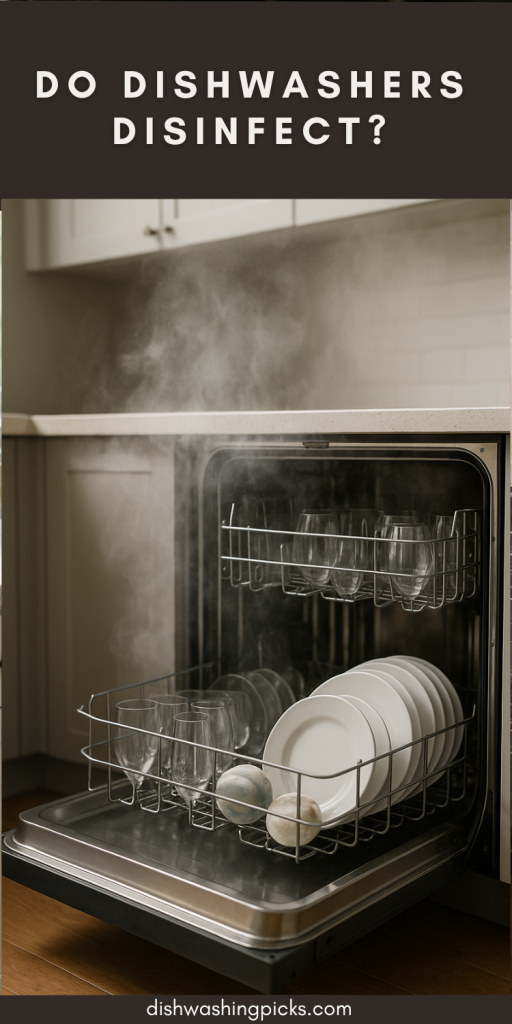
Ever loaded your dishwasher, hit start, and thought, “Okay, this thing cleans, but does it actually disinfect?” You’re not alone! It’s a question a lot of us wonder about because, let’s face it, no one wants to put their plates and cups back on the table with a side of germs.
So, here’s the big question: Do dishwashers disinfect? The short answer: sometimes. But, like most things, there’s a bit more to the story. Imagine your dishwasher is a tiny, steamy germ-fighting ninja — but its powers depend on how you use it.
Now, before you think every dishwasher is a germ-busting superhero, let’s break down what “disinfect” really means and how your dishwasher stacks up.
What Does “Disinfect” Even Mean?
When we say “disinfect,” we’re talking about killing off harmful bacteria and viruses, not just cleaning off food scraps and grease. Think of it like washing your hands with soap versus slapping on hand sanitizer — one cleans, the other kills germs.
Dishwashers primarily clean by spraying hot water mixed with detergent, scrubbing away grime and food residue. But disinfecting means killing those sneaky microbes lurking around.
The Heat Factor: Your Dishwasher’s Secret Weapon
Here’s where it gets interesting — heat plays a huge role. Many dishwashers can reach temperatures around 130°F to 160°F during their cycle, and some even have a “sanitize” setting that bumps that up higher, sometimes over 150°F.
Imagine this: you’re blasting your dishes with hot water that’s as warm as a hot tub party (well, hotter actually). That heat can zap a lot of bacteria and viruses. The sanitize setting is designed exactly for this, to meet government standards for killing germs.
How Dishwashers Actually Sanitize — And Why It Matters
So, about that sanitize setting — it’s not just fancy marketing jargon. When you activate it, your dishwasher cranks the water temperature up and holds it there long enough to kill at least 99.9% of bacteria. Pretty impressive, right? This isn’t your run-of-the-mill hot water spray; it’s designed to meet strict standards set by the NSF (National Sanitation Foundation) for sanitizing.
But here’s a quick heads-up: Not all dishwashers come with this feature. Some budget-friendly models might just do the regular hot wash, which cleans but doesn’t quite disinfect. So, if killing germs is your top priority (and it should be, especially if you have little kids or anyone with a compromised immune system at home), check if your dishwasher has that sanitize cycle.
Not Just Heat: The Role of Detergents and Rinse Aids
You might be thinking, “Wait, isn’t heat alone enough?” Well, the truth is, it’s a tag team effort. Hot water helps kill germs, but detergents are the scrubbing sidekicks that break down grease and grime, making it easier for heat and water to reach every nook and cranny.
Also, rinse aids help water sheet off dishes, preventing spots and leftover film where bacteria could potentially hide. Think of detergent and rinse aid as the dynamic duo helping heat do its germ-busting job.
Practical Tips: How to Make Your Dishwasher Disinfect Like a Pro
Imagine this: you want your dishwasher to not just clean but actually sanitize your dishes, glasses, and utensils. Here’s how to get there:
- Use the sanitize cycle if your dishwasher has one. This is key to really kill those pesky germs.
- Run the hottest water possible. Before starting the dishwasher, run your kitchen sink hot water to warm up the pipes—this helps your dishwasher reach higher temps faster.
- Don’t overload the dishwasher. Cramped dishes mean water and heat can’t reach every surface, reducing effectiveness.
- Choose the right detergent. Look for one with antibacterial properties or that’s recommended for sanitizing cycles.
- Regularly clean your dishwasher. A dirty dishwasher is like a petri dish — yikes! Wipe down seals, filters, and run cleaning cycles to keep it germ-free.
What Dishwashers Don’t Do (So You Might Need a Backup Plan)
Dishwashers are great, but let’s keep it real: they aren’t magical. They might not kill every single germ, especially if your water isn’t hot enough or if you skip the sanitize cycle. Also, certain viruses or stubborn bacteria can be tougher to zap.
Sometimes, you might want to add an extra layer of cleanliness — like washing baby bottles separately or using a disinfectant wipe on high-touch items. Think of your dishwasher as a solid first line of defense, but not the whole army.
So, Do Dishwashers Disinfect?
The bottom line? Yes, dishwashers can disinfect, but only under the right conditions. Using the sanitize setting, hot water, proper detergent, and good loading practices means your dishwasher isn’t just cleaning—it’s fighting germs like a champ.
Next time you hit “start,” imagine your dishes going through a steamy, germ-zapping spa treatment instead of just a regular rinse. Cool, huh?
